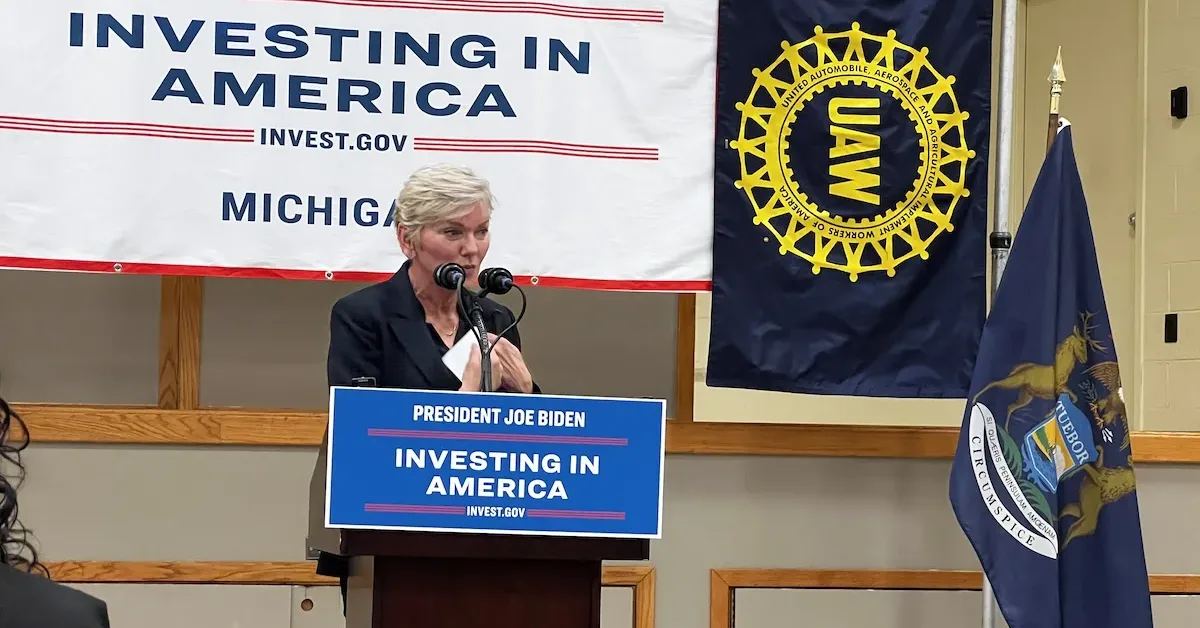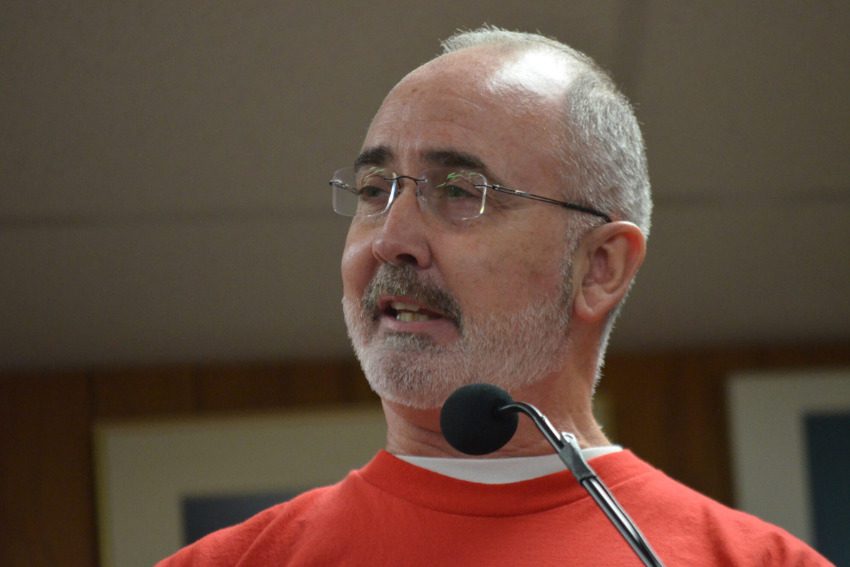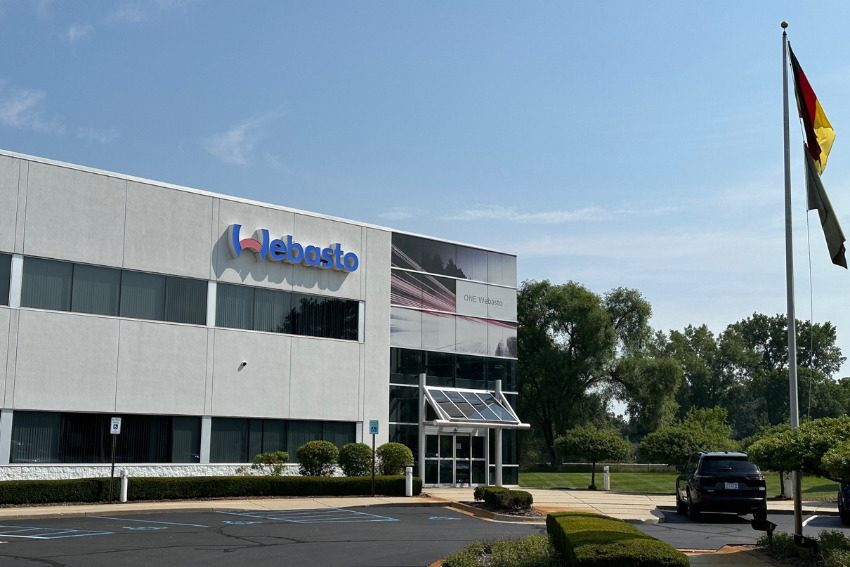
(Kyle Kaminski/The 'Gander Newsroom)
BY JON KING, MICHIGAN ADVANCE
MICHIGAN—It was hard to miss the campaign-like atmosphere of an event Tuesday in Lansing to launch a workforce development training program for high-tech battery manufacturing.
Held at UAW Local 652, near the site of the New Ultium battery facility in Delta Township, which is expected to create 1,700 jobs once it reaches full production in 2025, the announcement featured a lineup of Democratic officials, including Gov. Gretchen Whitmer, US Energy Secretary Jennifer Granholm, acting Labor Secretary Julie Su and US Rep. Elissa Slotkin (D-Holly), each touting President Joe Biden administration policies and legislation they contended had created a rebound in American manufacturing.
Slotkin noted the stature of the lineup of officials that also included UAW President Shawn Fain.
“To bring together this front row here of just, I’m sorry, bad asses,” said Slotkin to laughter from the crowd. “I have to say the beauty of being a legislator is when you get to see the stuff that you vote on, actually matter in your own district, in your own state.”
The stuff to which Slotkin was referring was the $5 million investment by the Department of Energy for the Battery Workforce Initiative that will, according to a release, “support up to five pilot training programs in energy and automotive communities and advance workforce partnerships between industry and labor for the domestic lithium battery supply chain.”
While the $5 million is just a small fraction of the $1.2 bipartisan infrastructure bill signed by Biden in 2021, Whitmer said it was a key piece of the strategy to keep the US, as well as Michigan, at the forefront of electric vehicle manufacturing.
“This battery workforce initiative will ensure that we are all on the same page,” she said. “Literally for too long, we’ve allowed other nations to lead battery manufacturing. No longer. We are going to bring the supply chain of electric vehicle production from batteries to brakes home to Michigan and home to the United States.”
Whitmer was preceded as a speaker at the event by one of her predecessors, Granholm, who spoke about the Biden administration’s “holistic” approach to crafting an industrial strategy.
“You can provide incentives for employers to come, but if you are not making sure that you have a workforce that’s trained for those jobs, those future facing jobs, then you will have missed the whole pie in the electric vehicle space,” said Granholm. “We can be building these cars, but if people have range anxiety about buying them and feeling like they’re not going to get a charge, then you will have missed a piece of the strategy, which is why Michigan received $110 million from our electric vehicle infrastructure funding from the bipartisan infrastructure law to fill in the gaps where the private sector isn’t going to be able to plug in your vehicle in all places.”
Fain echoed that sentiment, but brought it down to a personal level, saying it was appropriate he was speaking at an event about a training program a year to the day that he was sworn in as the new union president.
“And there’s not a better reason for me to be here and a better way to celebrate that than talking about what we’re going to talk about today,” he said. “I got my start in the labor movement as an apprentice electrician. It was the training I received in that apprenticeship that paved the way to a better life for me and my family.”
“I know struggle,” Fain continued. “I went through unemployment. I’ve been on government aid before. I don’t make that a secret to anybody, and apprenticeship was life changing for me. So, when we started talking with the Department of Energy and the Department of Labor about the Battery Workforce initiative, I saw that it could provide the same path for a better life for workers.”
Su said that the path to a better life to which Fain referred was best made possible by ensuring a complete process geared toward a well-trained and satisfied workforce.
“We know that when we create connections to jobs and we make sure that they’re good jobs, that the workforce development can also drive job quality, [it] can drive the kinds of jobs that we’re trying to build,” she said. “It’s not just about any job. It’s really about making sure that we’re creating good jobs with real opportunity and security. So today’s announcement is another example of how we’re being intentional about this.”
Specifically, the training will be used to develop a US Department of Labor-approved credential that community colleges and other training providers can use to prepare students for in-demand jobs. One of the institutions hoping to be selected for one of the pilot programs is Lansing Community College (LCC), whose Provost, Dr. Sally Welch, also spoke and said they are committed to readying a workforce that will have the technical training required for long-term success.
“Our job training center has developed EV battery boot camps to serve as the pre-employment short term training that will lead to entry level employment within the EV battery manufacturing industry,” she said. “LCC is committed to enhancing the knowledge and the skills of the workforce.”
Speaking afterward with reporters, Slotkin said she expected that the pilot program will be selected and up and running within a year.
“I’m hoping LCC will be one of the pilots and they are actively testing it out in the first year of training,” she said. “I think what we heard today is let’s get a standard practice. Frankly, there were some folks from the private sector inside the green room there who had provided some input on those standards because they’re doing it here in the Lansing area and we need to make it systematic, and then we can have places like LCC teach a curriculum.”
Granholm said that since passage of the Inflation Reduction Act in 2022, 22 of the 42 factories that have been located in the state have involved electric vehicle battery manufacturing. But the sector has not been without controversy, particularly with the proposed $2.36 billion electric vehicle battery plant in Mecosta County owned by Gotion Inc., the US-owned subsidiary of Chinese battery manufacturer Gotion. While receiving more than $700 million in state tax incentives. It has also received sharp criticism from Republicans who contend it is a front for the Chinese Communist Party.
Chief among those critics has been US Rep. John Moolenaar (R-Caledonia) was named on Monday chair of the Select Committee on the CCP, which has been focused on threats posed by the Chinese Communist Party.
When asked how that might affect the overall effort toward electric battery manufacturing, Slotkin said she was optimistic it wouldn’t be an impediment.
“Rep. Moolenaar has certainly been focusing on that, but I honestly don’t know what their schedule is going to be and what they’re going to be focusing on,” she said. “I mean, there’s a bunch of us doing legislation on China-related issues, and my hope is this is an area where Democrats and Republicans largely agree, so I hope that that’s the spirit with which the committee is pursued.”
Slotin is running for U.S. Senate this November and is facing actor Hill, Harper and businessman Nasser Beydoun for the Democratic nomination.
The race for the GOP nomination is far more crowded. Those running for the are: physician and former U.S. congressional candidate Sherry O’Donnell, who just filed her signatures Monday, former US Reps. Mike Rogers (R-White Lake), Peter Meijer (R-Grand Rapids) and Justin Amash (I-Cascade Twp.); Detroit-area businessman Sandy Pensler; Alexandria Taylor, an attorney who has previously represented former Michigan GOP Chair Kristina Karamo; conservative businessman J.D. Wilson; Sharon Savage, an educator who worked for the Warren Consolidated School District for 42 years; Ottawa County Commissioner Rebekah Curran; Sault Ste. Marie physician Bensson Samuel; entrepreneur Glenn Wilson, and Michael Hoover, who previously worked for Dow Chemical Co.
READ MORE: Greater Lansing to get 50 new EV chargers due to Biden administration funds
This coverage was republished from Michigan Advance pursuant to a Creative Commons license.

Fain rallies with Stellantis UAW members at Trenton plant ahead of strike authorization vote
BY KEN COLEMAN, MICHIGAN ADVANCE MICHIGAN—Union members and elected officials rallied on Wednesday against Stellantis arguing that the automaker...

Pro-union group requests investigation of Webasto for alleged anti-union efforts at Detroit plant
BY JON KING, MICHIGAN ADVANCE MICHIGAN—A German-based auto parts manufacturer is facing another complaint about alleged union busting activities at...

Report: Federal investments charge up 18,000 new EV manufacturing jobs for Michiganders
A recent analysis shows that federal policies and legislation have dramatically expanded investments in electric vehicle and EV battery...

Trump-appointed judge strikes down FTC ban on noncompete agreements
FTC spokesperson Victoria Graham said that the decision “does not prevent the FTC from addressing noncompetes through case-by-case enforcement...

Gary Peters brings retired Teamsters onstage during DNC speech
BY ANNA LIZ NICHOLS, MICHIGAN ADVANCE CHICAGO—Having middle-class union parents allowed he and his sisters to have the ability to pursue their...




